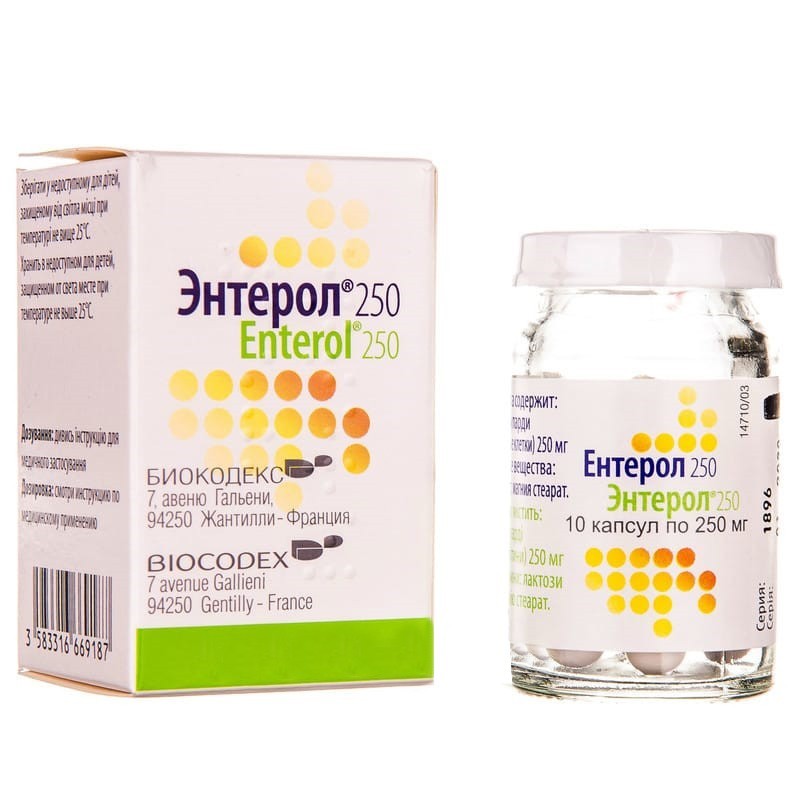



 Secure and encrypted payment processing
Secure and encrypted payment processing We ship to over 40 countries including the USA, UK, Europe, Australia and Japan
We ship to over 40 countries including the USA, UK, Europe, Australia and Japan Guaranteed refund or reship if you haven't received your order
Guaranteed refund or reship if you haven't received your orderEnterol® 250 normalizes the intestinal microflora and has a pronounced etiopathogenetic antidiarrheal effect. during passage through the gastrointestinal tract saccharomyces boulardii cncm i-745 exert a biological protective effect relative to normal intestinal microflora.
The main mechanisms of action of Saccharomyces boulardii CNCM I-745:
The genetically determined resistance of Saccharomyces boulardii CNCM I-745 to antibiotics substantiates the possibility of their simultaneous use with antibiotics to protect the normal digestive tract biocenosis.
Pharmacokinetics After taking the drug, a high concentration of Saccharomyces boulardii CNCM I-745 in the large intestine is quickly achieved, which is maintained for 24 hours. Saccharomyces boulardii CNCM I-745 do not penetrate into the systemic circulation and mesenteric lymph nodes. After treatment, Saccharomyces boulardii CNCM I-745 is completely excreted in the feces for 3-5 days.
Prevention and treatment of colitis and diarrhea associated with taking antibiotics, intestinal dysbiosis, acute and chronic bacterial diarrhea, acute viral diarrhea, irritable bowel syndrome, travelers diarrhea, pseudomembranous colitis and diseases caused by clostridium difficile, diarrhea associated with long-term enteral nutrition.
The dose and duration of treatment is determined by the doctor depending on the nature and course of the disease.
Newborns: no more than 1 sachet per day under the supervision of a doctor.
Children under the age of 6 years: 1 sachet 1-2 times a day.
Adults and children over 6 years of age: 1-2 sachets or capsules 1-2 times a day.
Recommended Duration of Treatment
Acute diarrhea: 3-5 days.
Treatment of dysbiosis, chronic diarrheal syndrome, irritable bowel syndrome: 10-14 days.
Prevention and treatment of antibiotic-associated diarrhea and pseudomembranous colitis: Enterol® 250 to take in antibiotic regimens from the first day of use until the end of antibiotic treatment.
Travelers diarrhea: start of use - 5 days before arrival, 1 capsule / sachet per day throughout the trip; end of application: on the day of arrival from the country visited.
The drug should be used every morning on an empty stomach. The maximum period of use is 30 days. Capsules are recommended to be washed down with water. Mix the contents of the bag with milk or water.
Hypersensitivity to any component of the drug. patients with a central venous catheter.
In individuals with individual intolerance to any component of the drug, hypersensitivity reactions are possible, including skin rash, itching, exanthema, urticaria, anaphylactic reactions, angioedema, anaphylactic shock, flatulence, epigastric discomfort. in very rare cases, there is a risk of fungemia in hospitalized patients with a central venous catheter.
If the symptoms of the disease persist for more than 2 days of treatment at the usual dosage, a doctors consultation and dosage adjustment are necessary.
Enterol® 250 mg contains live culture.Therefore, the drug should not be mixed with very hot (50 ° C), cold drinks, alcohol-containing liquids, very hot or cold foods.
Treatment is not a substitute for rehydration when necessary. The volume of rehydration and the route of fluid administration (oral / iv) should be consistent with the severity of diarrhea, the age and general condition of the patient.
It is advisable not to open capsules or sachets near patients with central venous catheters installed to avoid colonization, especially associated with mechanical transfer during catheter manipulation. There is evidence that in patients with a central venous catheter who did not even receive S. boulardii CNCM I-745, in very rare cases of fungemia (penetration of yeast into the blood), it most often manifests as fever and a blood culture positive for saccharomycetes. The result of treatment in all these cases was satisfactory on the background of taking the antifungal drug and, if necessary, removing the catheter. The drug contains lactose, so patients with rare hereditary forms of galactose intolerance, lactase deficiency or glucose-galactose malabsorption syndrome should not use the drug.
For the dosage form, powder for oral use: due to the presence of fructose, this drug should not be used for fructose intolerance.
Use during pregnancy and lactation. No clinically significant malformative and fetotoxic effects have been identified at this time. However, monitoring pregnancy in women taking this drug is not sufficient to rule out any risk. Thus, as a precaution, it is advisable to avoid using this medication during pregnancy.
During lactation, the drug can be used under medical supervision.
The ability to influence the reaction rate when driving vehicles or other mechanisms. Does not affect.
Children. The drug in the form of capsules is used in children over the age of 6 years. For children under 6 years of age, the use of Enterol is recommended® 250 in the form of lyophilized powder for oral administration.
It should not be taken simultaneously with antifungal agents when administered orally or in combination.
Not described.
In the original packaging at a temperature not exceeding 25 ° c, out of the reach of children.